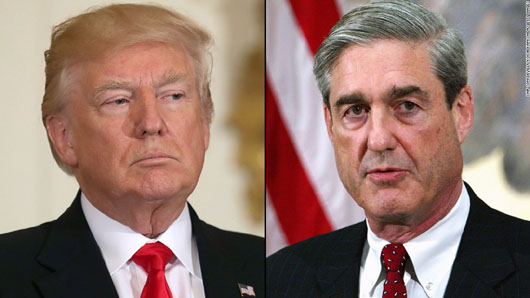by WorldTribune Staff, August 10, 2017
The late Roy M. Cohn, the honorary counsel for WorldTribune and an ally of Donald Trump, would no doubt be in the President’s corner were he still among the living.
Cohn was known for settling “matters” with a mere phone call.

But New York rules are not in play in today’s Washington, the city of lawyers and federal employees each of whom seem to agree on one thing: The cost of “draining the swamp” would be prohibitive from a personal point of view.
As special counsel Robert Mueller continues to add heavy-hitters to his team investigating alleged ties between the Trump campaign and Russia, the president has not assembled the kind of massive team of legal allies employed by former President Bill Clinton.
The president may reason that he has done no wrong and to engage in a protracted legal battle would paralyze his administration and render it ineffective. If so, inquiring minds want to know what is his strategy?
Mueller, who began putting together his team of fraud and constitutional law experts immediately after he was appointed in May, recently hired his 16th lawyer, former fraud prosecutor Greg Andres, who for the past five years represented Wall Street banks in New York, Bloomberg reported on Aug. 10.
President Donald Trump’s legal team, meanwhile, consists of three people: John Dowd, the president’s chief personal attorney, Jay Sekulow, a Christian-rights lawyer who serves as the public face of the defense team, and Ty Cobb, who will oversee the White House response to Mueller’s investigation.
Battling Mueller without a high-powered legal operation “is like going to a knife fight with a stick of butter in your hand,” says Nicholas Allard, a former Washington attorney who’s now the dean of Brooklyn Law School. “The team should reflect the importance of what’s at stake, which is nothing less than the future of this presidency.”
By comparison, Bloomberg noted, Bill and Hillary Clinton – both Yale Law grads – “set up a war room on the top floor of the old executive office building next to the White House,” to deal with the sexual harassment and Whitewater investigations.
The war room was “where lawyers and staff would go through documents that needed to be turned over. Meetings were held several times a day, with lawyers shuttling between the White House, the executive building, and the offices of Skadden and Williams & Connolly a few blocks away,” the Bloomberg report said.
“Through much of his eight years in the White House, Clinton spent millions of his own money” retaining Williams & Connolly and Skadden, two of Washington’s preeminent firms.
At this point, Trump’s legal team doesn’t see any need to set up a Clinton-style war room, a person familiar with Trump’s legal strategy told Bloomberg.
The strategy “adopted by those close to Trump, if not his legal team, has been to try to discredit Mueller’s investigation by pointing out potential conflicts of interest or political biases that may exist among his investigators,” Bloomber said.
“I don’t get any sense that they’re trying to get ahead of anything,” says Don Goldberg, who worked in the White House Counsel’s Office during the Clinton administration. “You wonder about whether the top people at the White House really understand what they’re stepping into.”
Meanwhile, it is a “cybersecurity wonk” on the federal bench who could play a major role in deciding team Trump’s fate, Betsy Woodruff reported for The Daily Beast on Aug. 10.
Beryl Howell, chief judge of the U.S. District Court for the District of Columbia, “is in a position to make pivotal decisions. And her importance could only grow,” Woodruff’s report said.
Federal court rules indicate that Howell signed off on Mueller’s request to assemble a grand jury.
Howell will be in position to decide whether or not Trump allies’ lawyers “can quash subpoenas, and whether or not people like Jared Kushner can invoke what’s known as executive privilege to get out of testifying under oath before Mueller’s grand jury,” the report said.
Howell’s decisions could be immensely consequential.
“Even though she worked for Democrats on the Senate Judiciary Committee, she’s been very straight-arrow as a judge and she wouldn’t be impaneling a jury for the heck of it, or anything less than there being ample justification for it,” said a former federal lobbyist, referring to Howell’s previous work for Sen. Patrick Leahy. “She’s like Mueller: He wouldn’t ask for it unless he had more than enough evidence to justify it, and she wouldn’t have granted it unless he did.”
Woodruff’s report, citing former federal prosecutor Andrew McCarthy, noted that the grand jury could put together a report that would kick off impeachment proceedings.
“The manual for U.S. attorneys says that before the grand jury could issue a report making any of its findings public (or available to Congress), a judge – meaning Howell – would have to approve it,” Woodruff’s report said.
Subscribe to Geostrategy-Direct __________ Support Free Press Foundation
